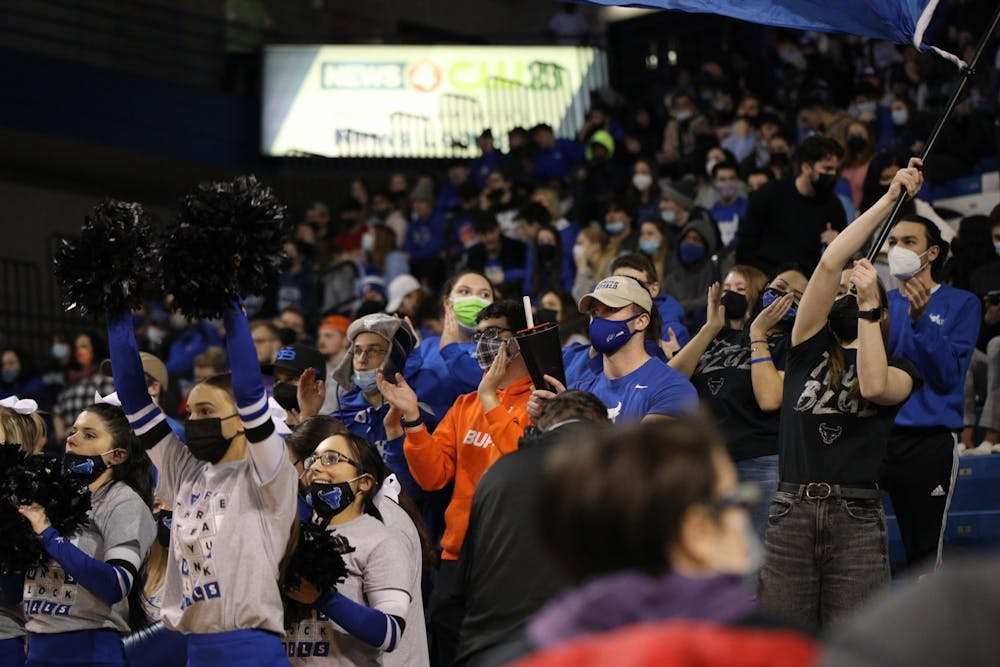UB Athletics had a budget of roughly $36.2 million in 2021, according to the NCAA Membership Financial Report The Spectrum received on March 11. The report covered expenditures and revenues for the 2021 calendar year.
COVID-19 once again had a major impact on the department’s ticket revenues and game travel expenditures. Here’s a look at the 2021 athletic budget:
The biggest institutional expenditures
Across both fiscal years, UB’s biggest expenditure was its coaches, trainers and “overall staff” — although 2021 was the most expensive year, to date.
UB spent $8.81 million on coaches, support staff and administrative compensation in 2021 — a $24,287 increase from 2020.
Athletic student aid continued to be the second-biggest expenditure at $8.12 million — which represents a slight decrease from 2020. This total includes money for tuition discounts and waivers, summer school, student managers, graduate assistants and expenses for inactive student athletes (due to medical reasons or expired eligibility).
A shaky foundation for this year’s income
A $1.2 million decrease in ticket sales punctuated UB Athletics’ $2.5 million decline in revenue from 2020 to 2021.
The department made only $5,472 in ticket sales last year — a stunning figure that can be explained by COVID-19 and its impact on collegiate athletics. In 2020-21, only basketball, track and field and cross country earned revenue from ticket sales.
Men’s sports brought in $2,754 in ticket revenue, while women’s sports brought in $2,718 in ticket revenue.
The 2019-20 season — also affected by COVID-19, which shut down collegiate athletics in March 2020 — saw men’s basketball bring in $232,573 in ticket revenue and women’s hoops bring in $224,924 in ticket revenue. Football brought in $787,168 in ticket sales.
UB Athletics spends the most on football
Unsurprisingly, UB Athletics spends more money on football than on any other sport.
The department spent $3.41 million on football scholarships, $2.18 million on football coaching expenses, $803,097 on football support staff/administrative compensation, benefits and bonuses, $149,919 on football recruiting and $548,386 on football team travel in 2020-21 — all of which far outpaced that of other sports.
Football also brought in — and spent — the most money in 2021, at approximately $10.1 million. Men’s basketball came next, at $2.57 million, followed by women’s basketball, at $2.07 million, and women’s soccer, at $876,412. Men’s tennis brought in the least, at $440,538.
Which sport receives the most athletic student aid?
The football team also outpaced student-athletes in all other sports in terms of scholarships. The program received $3.41 million in athletic student aid in 2020-21, which was distributed to 94 football players.
Women’s basketball came second at $634,300, which was distributed to 17 players. Men’s basketball came third, at $561,354, which was distributed to 14 players. Men’s tennis — with its six scholarship athletes — received the least amount of athletic student aid, at $168,663.
Men’s track and field brought in the least amount of athletic student aid per athlete, at approximately $5,700 ($187,736 total).
In total, men’s sports received $4.62 million for 174 student-athletes; by contrast, women’s sports received $3.5 million for 140 student-athletes.
Men’s teams’ revenues, expenditures double that of women’s teams
Men’s teams brought in and spent nearly $14.29 million in 2020-21 — nearly doubling that of UB’s women’s teams, who brought in and spent roughly $7.34 million in that same time.
Football ($10.1 million), men’s basketball ($2.57 million) and wrestling ($664,487) led the way for men’s sports, while women’s basketball ($2.07 million), swimming and diving ($1.02 million) and volleyball ($978,295) led the way for women’s sports.
Meanwhile, UB Athletics didn’t record any expenditures for its spirit groups — which include bands, cheerleaders, mascots and dancers — in 2020-21. By contrast, these groups had $7,007 in expenditures in 2019-20.
Kayla Sterner is an assistant sports editor and can be reached at kayla.sterner@ubspectrum.com
Sophie McNally is an assistant sports editor and can be reached at sophie.mcnally@ubspectrum.com

Kayla Sterner is an assistant sports editor at The Spectrum. She is studying communications with the hopes of being a sideline reporter. In her spare time, she can be found in the gym, watching football or vibing to Mac Miller. Kayla is on Twitter @kaylasterner.

Sophie McNally is an assistant sports editor at The Spectrum. She is a history major studying abroad for a year from Newcastle University in the UK. In her spare time, she can be found blasting The 1975 or Taylor Swift and rowing on a random river at 5 a.m.





